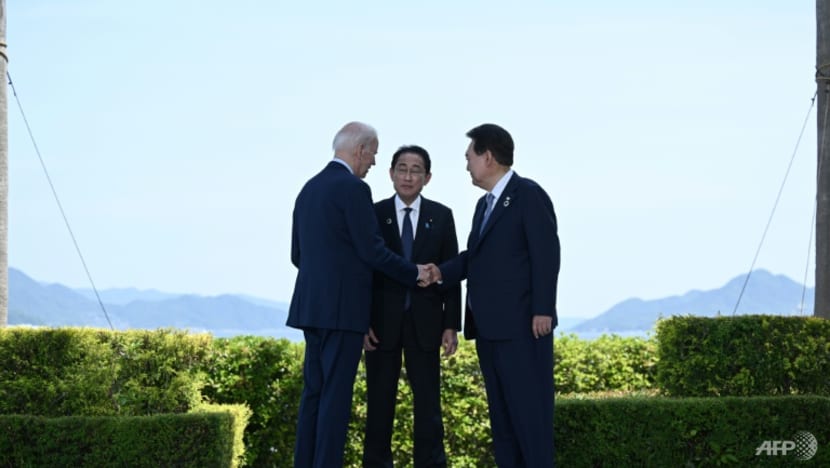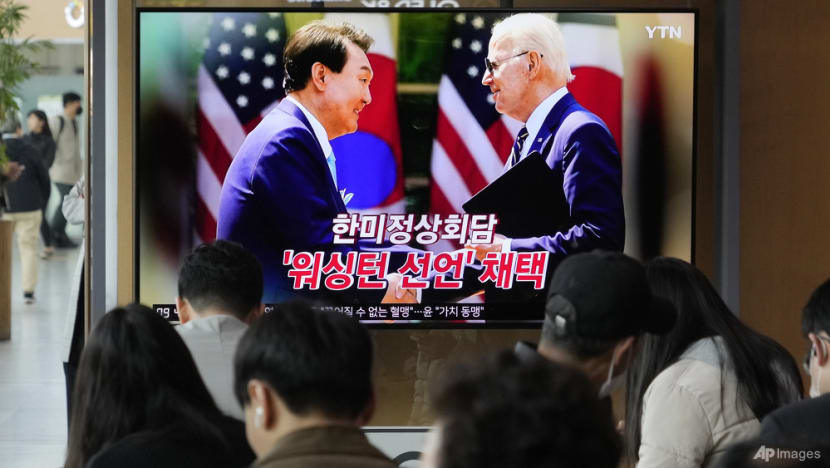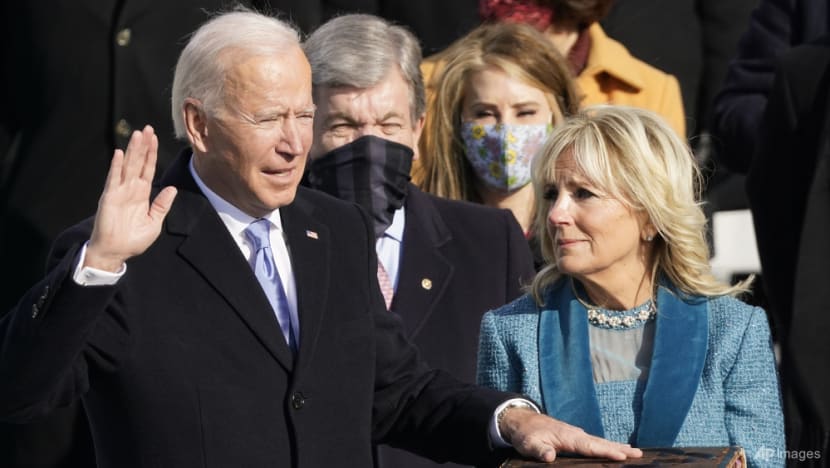China, North Korea on the agenda, as US, Japan, South Korea leaders convene to forge closer ties
United States President Joe Biden will host Japanese Prime Minister Fumio Kishida and South Korean President Yoon Suk Yeol at Camp David, a rural retreat just north of Washington DC, on Friday (Aug 18).

WASHINGTON: Leaders of the United States, Japan and South Korea will meet on Friday (Aug 18), in what experts call an effort to sustain the momentum of their trilateral ties.
US President Joe Biden will host Japanese Prime Minister Fumio Kishida and South Korean President Yoon Suk Yeol at Camp David, a rural retreat just north of Washington DC.
Besides forging stronger ties, top of their agenda would be countering the threats posed by China and North Korea.
Mr Kishida and Mr Yoon will be the first foreign leaders to visit Camp David since 2015.
Differences in other domains still remain, however, including Japan and South Korea’s concerns over the Biden administration’s economic policies.
REGULAR ENCOUNTERS
Japan and South Korea were barely on speaking terms just two years ago, but much has changed now with both countries under new administrations.
Mr Yoon visited the White House in April, just months after Mr Kishida sat in the Oval Office for a fireside chat.
Mr Biden had also visited both countries back-to-back last year.
The trio will be gathering on American soil, after they recently met at the Group of Seven (G7) summit in Japan in May, and again at the North Atlantic Treaty Organization (NATO) summit in Lithuania last month.
The reason for the Camp David meeting being held so soon after the one on the sidelines of the NATO summit, “is really to sustain this momentum and to try to really institutionalise this trilateral relationship,” said Professor Andrew Yeo, senior fellow at think tank Brookings Institution and professor of politics at the Catholic University of America.
CHINA AND NORTH KOREA
The three leaders will also be discussing the issue of China, as the two Asian allies of the US regard Beijing’s increasing assertiveness and military posturing across the Taiwan Strait as a threat to their national security.
Beijing’s actions are also seen as a challenge as the US sets out to contain its geopolitical rival.
Prof Yeo noted that the South China Sea has been an area of concern where the Chinese have been building up artificial islands and militarising them.
“I think they will make a statement about reinforcing the freedom of navigation and supporting the rules-based order,” he said.
North Korea will also be on the agenda, as the country returns to its harsh rhetoric and nuclear tests, years after former US President Donald Trump’s groundbreaking handshakes with Kim Jong-Un in Singapore and the Demilitarized Zone.
Hudson Institute senior fellow Riley Walters told CNA: “We saw earlier this year the US and South Korea issue the Washington Declaration, which guaranteed the continued mutual defence.
“Hopefully out of this (meeting), we could see more commitments for trilateral exercises. Information sharing is always important too.”

Mr Walters said it is important to lock these down for future political considerations, so that the countries will still have these agreements even if Mr Biden, Mr Kishida or Mr Yoon are no longer in office, “because they eventually will change”.
DIFFERENCES STILL TO BE IRONED OUT
There remains, however, issues to be ironed out among the three countries.
Mr Matthew Goodman, senior vice-president for economics at the Center for Strategic and International Studies, said that some of the economic policies pursued by the Biden administration at home has a “protectionist bent” which concerns its allies like Japan and Korea.
These include policies which are good for US growth, along with potential critical investments in clean energy that would reduce costs and provide new technologies for its people.
“So I think there are still some doubts on the economic side about the Biden administration’s approach to the region,” said Mr Goodman.

Mr Biden’s Asia pivot is unlikely to be on the minds of most American voters when they head to the ballot box next year.
However, it has wider global implications, as the Asian leaders are two counterparts with whom President Biden can seemingly see eye-to-eye, raising the potential for enduring collaboration, observers said.
The fact that the three leaders have met so regularly of late is a possible sign that they are forging a path towards the future, despite strained relations in the past, they added.
















